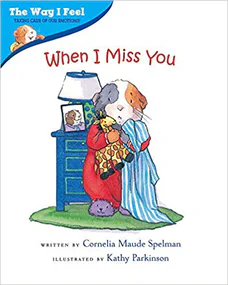When I Miss You
Written by Cornelia Maude Spelman
Illustrated by Kathy Parkinson
24 pages
•
Published 2004 (Albert Whitman & Company)

Recommended Age Range: Preschool through Kindergarten.
Publisher's Summary:
Young children often experience anxiety when they are separated from their mothers or fathers. This newest title in The Way I Feel series features a young guinea pig who expresses her distress when her mother and father go away. “Missing you is a heavy, achy feeling. I don’t like missing you. I want you right now!” Eventually the little guinea pig realizes that sometimes she and her parents can’t be together. When that happens, she knows that others can help.

Dr. Annie's Takeaways
Recommended for: Young children who are anticipating missing a caregiver or who are currently missing a caregiver will benefit from the validation this book provides as well as the gentle suggestions for ways to soothe the ache of missing a loved one. This would be a great read prior to a first day of school or to a caregiver going on a trip, or before a child is left with a babysitter. Anyone who ever watches a child while they’re separated from a parent/ caregiver (e.g., relatives, teachers, babysitters) may want to have this book on hand for moments of missing mom or dad (or any other important caregiver). Although divorce isn’t specifically addressed in this book, a child with separated parents might also benefit from reading this book when they are staying with one parent and missing the other.
Would a child like it? This book would likely be soothing and validating for many young children.
Evidence-Based Practices:
Self-Soothing
Tone: Validating, reassuring, straightforward
Story Quality: This story is told in the first person, from the perspective of a young guinea pig to her caregiver (e.g., “I want to show you something, but I can’t. I wish you were here with me!”). The book is written as a series of “I statements” that move from expressing sadness and frustration to empowerment (e.g., “There are ways I can help myself. I can cuddle with my blanket or stuffed animal.”) The guinea pig shares her feelings about separations in a way that will validate many children with similar feelings and provide language they can use when they feel the same way.
Illustrations: Fairly cute watercolor illustrations of anthropomorphized guinea pigs.
Representation: The young guinea pig is not gendered. The publisher’s summary uses she/her pronouns, but there are no gendered indicators in the pictures or text. The young guinea pig has a mother guinea pig and a father guinea pig, who are both fairly traditionally gendered (e.g., dad wears a suit and goes on a business trip), and she has a teacher who is a female guinea pig. Most, but not all, of the images of the caregiver who is missed are of the mother guinea pig.
Psychological Practices: This book provides children with language to express their feelings of missing a caregiver when they’re away, and it normalizes and validates these feelings. It also shares different strategies children can use to feel better when they’re missing their caregiver (“When I miss you, there are ways others can help me. They can remind me that you’ll be back. They can snuggle with me or we can play”; “There are ways I can help myself. I can cuddle with my blanket or stuffed animal. I can get in a cozy place and look at my favorite book. I can draw a picture to show you”). It ends with the reassuring statement, “When I miss you, I know you’ll be back.”
Concerns: None
